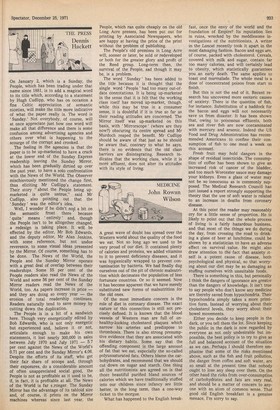THE PRESS
Dennis Hackett
On January 2, which is a Sunday, the People, which has been trading under that name since 1881, is to add a magical word to its title which, according to a statement by Hugh Cudlipp, who has on occasion a fine Celtic appreciation of semantic niceties, will make the title more indicative of what the paper really is. The word is ' Sunday.' Not everybody, of course, will at once appreciate just how one word will make all that difference and there is some confusion among advertising agencies and others over what is happening to the scourge of the corrupt and crooked.
The feeling in the agencies is that the paper is to be up-marketed to have a crack at the lower end of the Sunday Express readership leaving the Sunday Mirror, which has been gradually dirtied up over the past year, to have a solo confrontation with the News of the World. The Observer mischievously mentioned the change first, thus eliciting Mr Cudlipp's statement. Their story "about the People being upmarketed is quite untrue," said Mr Cudlipp, also pointing out that the Sunday' was the editor's idea.
Well, I wonder if he didn't nod a bit on the semantic front there because 'quite' means ' entirely ' and, though the People isn't to be altogether changed, a redesign is taking place. It will be effected by the editor, Mr Bob Edwards, and the deputy editor, Mr Alan Jenkins, with some reference, but not undue reverence, to some visual ideas presented by the Mirror. Of course, something has to be done. The News of the World, the People and the Sunday Mirror operate with a great deal of overlap between their readerships. Some 55 per cent of the People readers also read the News of the World and some 56 per cent of the Sunday Mirror readers read the News of the World, too. As papers increase in price — and they are doing so every year — the erosion of total readership continues. Readers naturally tend to save money by cutting down the duplication.
The People is in a bit of a sandwich here. Though very energetically edited by Bob Edwards, who •is not only energetic but experienced and, believe it or not, articulate enough to make his own statements, it lost nearly 300,000 in sales between July 1970 and July 1971 — 5.7 per cent against the News of the World's 0.71 per cent and the Sunday Mirror's 4.06. Despite the efforts of its staff, who get their fair share of scoops and, through their exposures, do a considerable amount of often unappreciated social good, the People is not as profitable as it used to be, if, in fact, it is profitable at all. The News of the World is far s„ronger. The Sunday Mirror has the advantage of its tabloid size and, of course, it prints on the Mirror machines whereas since last year, the People, which ran quite cheaply on the old Long Acre presses, has been put out for printing by Associated Newspapers, who are happy at having the price of the print without the problem of publishing.
The People's old premises in Long Acre will, sooner or later, be sold or redeveloped or both for the greater glory and profit of the Reed group. Long-term then, the survival of the People, sad though it may be, is a problem.
The word ' Sunday ' has been added to the title because it is thought that the single word ' People ' had too many out-ofdate connotations. It is being up-marketed in the sense that it is felt that the working class itself has moved up-market, though, while this may be true in a consumer sense, it is doubtful if it is true so far as their reading attitudes are concerned. The Mirror itself was up-marketed on this basis, with ' Mirrorscope ' (where are they now?) obscuring its centre spread and Mr Murdoch reaped the benefit. Mr Cudlipp should be aware of that just as he should be aware that, contrary to what he says, there is no evidence that the old class barriers are disintegrating. Research indicates that the working class, while it is more affluent, does not alter its attitudes with its style of living.










































 Previous page
Previous page